|
Louisville Scene Feature -
March 20, 1971 |
WKLO
Rock Radio: Sweet Sound of Money
Gone are the beeps and
the shouts, the treasure hunts and the blare, but the cash registers
jingle on.
By John Christensen
Louisville Times Staff Writer
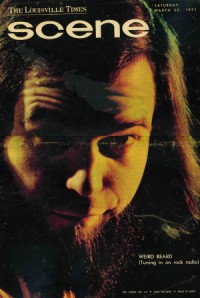
WAKY's Weird Beard
On the wall in Carl Truman
Wiglesworth's office at Radio WKLO, off from the posters of Creedence
Clearwater Revival, The Dells, Grand Funk Railroad, The Who and Bob
Dylan (upside down), over in a corner where it is mostly obscured by the
open door, is a picture.
It's a large, black-and-white glossy of Lee Gray, a WMCA (New York) Good
Guy! ("BONG!"), with a big, gleaming smile and an air of aggressive good
cheer that so much as says "Look out Levittown High, I'm coming your way
this Friday night with Ramar of the Jungle and the Rock Crock!"
Written on the left in black magic marker, in high reaching letters, is:
"If I told you how much I miss Louisville, it would take tears." And on
the other side of that New York show biz-personality smile, "Love you
all, Lee."
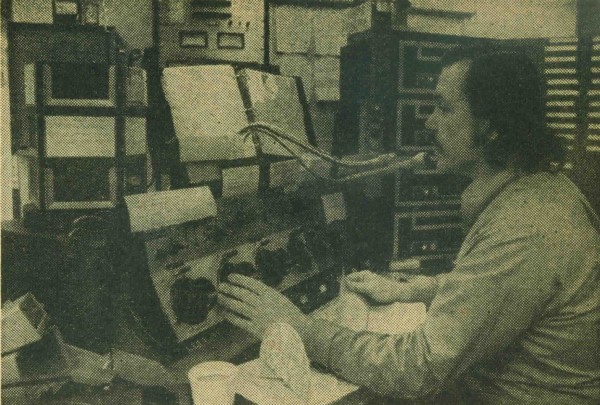
Lee Gray: Louisville's not Brylcreem, but
he came back. He is at WKLO.
Lee Gray had been at WKLO for five
years, spurned two previous offers to go to the big time and was well
satisfied until he got yet another offer. He accepted. Within months
after he left, he was back at WKLO where he is now the morning man,
doing the 6 to 10 a.m. shift playing the "Working Girl's Special" and
telling his listeners, "I hope this is the best day you've ever had."
Shortly before Gray returned, Bill Bailey, the self-proclaimed Duke of
Louisville as he was the Duke of Houston, Winston-Salem, Anchorage and
Salt Lake City before that, left to become the Duke of Chicago. Going to
the big time, Bailey was getting a reported $300,000, five-year contract
with a chance to make more at 50,000-watt, clear-channel WLS, if his
ratings were strong.
And not a year later, WAKY here ran ads in the papers and on billboards
saying "Bill Bailey Came Home!" He came home, all right, tired of what
he called the "teeny-bopper" music WLS played, and tired of what others
called the management's attempt to muzzle him.
And he came to WAKY, not WKLO where he had an extremely popular morning
show, saying, "I go where the money is. I don't do this for fun."
The money is definitely there. Bailey, it is commonly known in the
business, has a base salary of $28,000, receives a talent fee for doing
commercials and gets $1,000 for each point he leads his competitor in
the ratings. It is also commonly known that Bill Bailey's morning show
is No. 1 in the ratings.
Gray, a knowledgeable source says, is probably making a base salary of
between $20,000 and $25,000 plus other considerations. Which leaves him
with something more than a fine-tooth comb himself.
The point is this: While Louisville is hardly cosmopolitan and "big
time" only in the money its basketball team plays college seniors, it is
a lucrative marker for (sorry parents) rock radio.
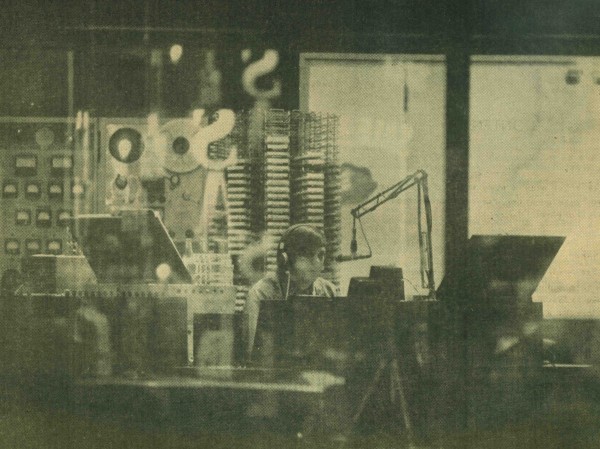
People in glass houses sell rock. "Dude"
Walker in WAKY's Fourth Street "showcase" studio.
IN THE BEGINNING…such a beginning!
A madman, everyone decided, had come to town. His name was Gordon
McLendon and he made such an outstandingly good offer for WGRC - an
exceedingly good price, agreed those in the know, for a station that was
sixth in the ratings - that its owner agreed to sell, although he hadn't
even thought of it.
Interestingly, McLendon began getting other offers. The Brooklyn Bridge?
How about a promising sand bar in the Ohio River?
But McLendon was undaunted, un-flapped and most important, uninhibited.
He inserted spots in the station's programming, promising that on July 7
of that year (1958), Louisville would go "wacky." What people didn't
know was that he meant "WAKY," since he planned to change the station's
call letters.
On the appointed day, he did just that, then ordered his disc jockeys -
imports from Top 40 (rock) stations in Texas and Louisiana - to play
"The Purple People Eater Meets the Witch Doctor." For two days straight.
After which, he promised a boggled reporter from The Courier-Journal
there would be a more "flamboyant" (i.e., rock 'n' roll) format
instituted.
It was.

And it was devastatingly simple (simple-minded, many would argue). The
disc jockeys arrested their listeners with a hard-sell, hard-rock,
rapid-fire delivery, very much like the guy who does those
1,000-words-a-minute commercials on late night TV for Veg-A-Matic and
other wondrous household items: "THAT WAS BOBBY DARIN AND 'SPLISH
SPLASH!' NUMBER THREE ON THE BIG 11 SURVEY! STICK AROUND! YOU'LL HEAR IT
AGAIN IN FOURTEEN MINUTES! BLANG-G-G-G!! WAKY, THE BIG 790, REACHING YOU
AND ONLY YOU WITH ALL THE HITS!! BLANG-G-G!!"
News was delivered in the same upbeat fashion; harsh, staccato blasts
from neo-Walter Winchells with a "BEEP!!" to punctuate each item. The
news itself was seldom more than a random collection of glorified
headlines, with a hyped treatment. Whether Elvis Presley's wife had a
baby or 31children were killed in a school bus crash, it was announced
with the same strident, detached voice anxious only to keep things
"BEEP" moving.
The noise was unremitting. The music was, to the adult's way of
thinking, a harsh, throbbing clash of sounds inconsistent with sanity,
beauty and peace. It was also exactly what the kids wanted, and that was
(and is) the target audience.
In fact, all of Louisville was fascinated, as if the station had been
overrun by a crazed band of unemployed carnival barkers who locked
themselves in and turned up the music. Most thought the frenzy would
pass, that the cacophony would shatter the nerves, and we'd all go back
to Perry Como.
Hah! McLendon came up grinning as WAKY exploded from sixth in the
ratings, with but 5 per cent of the listening audience, to first in the
ratings, with more than 40 per cent of the listeners. And did it in one
month.
Suddenly, people who had thought McLendon to be not a little soft in the
head were trying mightily to put money in his pocket. Advertising. And
WKLO, basically a country music station begun in 1948, switched to a Top
40 format in August 1959, duplicating McLendon's successful formula.
In 1962, McLendon sold his still successful, still No. 1,
first-in-Louisville rock station to the LIN Broadcasting Corp. for $1.35
million. A healthy profit and proper reward for someone with 20/20
foresight.
IN CASE YOU didn't know, rock radio continues to flourish. There are 12
AM stations in the metropolitan area (including WSAC in Ft. Know), and
all of them are making money. Some more than others, but making money
nonetheless.
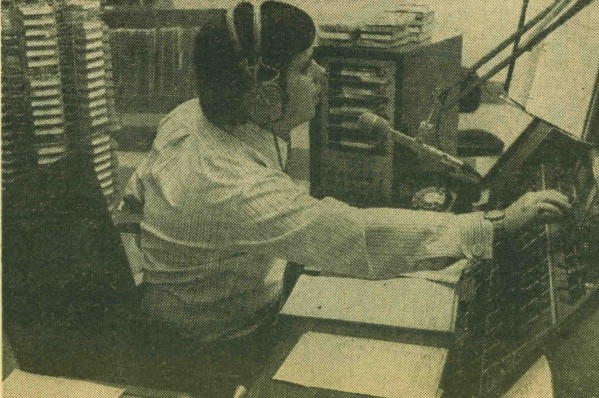
Jeff Douglas of WHAS: And a Ya Ha
to you, too.
"There are three stations in the area
with a gross billing of more than $1 million a year," said WAKY station
manager Don Meyers. "And we're one of them." The other two, it seems
safe to say, would be WAVE and WHAS. WKLO, also doing quite well, is not
far from the million mark.
Stations make money, because their product - rock music, country music,
middle-of-the-road stuff, you name it - costs them nothing. Their
expenditures are limited to salaries, utility bills, etc. Meyers added,
neither boasting nor moaning, that "I think it's safe to say we also
have the highest payroll in the area."
Which doesn't really bother him since WAKY also occupies the top spot in
the ratings. (A note here about ratings. There are nearly as many
ratings as stations, and they are based on everything from the sex of
the listener to the number of pairs of white shoes he has. Each station
is fond of quoting the rating which lists it highest - for obvious
reasons. The hapless reporter, then, is left to wander through the
labyrinth and make a coherent road map. Therefore - a flourish of
trumpets, please - we're going with WAKY.
Something else. While rock radio has refused to fold, as was, and is,
fervently hoped for by the more staid citizens in our republic, it has
refused even to hold its ground. Rather, it is advancing, expanding,
acquiring new listeners the way Israel enlarged its holding in the
six-day war of 1967. Where it once claimed listeners hovering around the
age of puberty, it now reaches more people up to the age of 34 than any
other kind of radio. Or that's what they say.
Their argument is persuasive. The kids who loved "Blue Suede Shows" and
"Hound Dog" have stayed with the music, and it has been 15 years and
then some, and many of them are mothers and fathers now. Meanwhile, the
bottom (in age) end of the market remains constant in its interest;
children go from guns and dolls to James Taylor and The Jackson Five -
and guys and dolls.
Another reason is the music itself, says Johnny Randolph, the
27-year-old program director at WAKY. Seated in his comfortable, paneled
office, he gestured at a speaker in his office from which came The Fifth
Dimension, singing "Love's Lines, Angles and Rhymes." The music," he
said, "is more palatable now. Like this one.
"Besides that, the accent in our society is young. Look young, stay
young - and people are discovering that rock stations are not as bad as
they thought. And during all this, the middle-of-the-road stations like
WAVE and WHAS were asleep. Now, they're coming back and they play much
of the same kind of music we're playing."
The reason is simple. "From a standpoint of revenue, there's bundles of
money in teen-agers and young adults," said Randolph.
In the past year and a half, WHAS, Radio 84, the clear-channel,
50,000-watt middle of the roader with a daytime listening audience in
five states, has vastly changed its programming. And it is a change
directly attributed to rock.
It hired a new program
director, Hugh Barr, a 35-year-old veteran of several rock stations,
most recently in Salt Lake City, and to him must go the credit, or
discredit if you will, for the transformation.
"We've always been strong with the people over 50," he said recently,
"But we like to broaden our appeal. For two decades, we had been playing
what we call 'chicken rock.' I mean by that, we'd play Ray Conniff
instead of the original version. And people have either gotten into the
habit of listening to us, or not, because of that. Their habits are
ingrained.
"Now, we're tying to think in terms of today's music. We've tried to
take a whole block of what's best in today's music wherever it comes
from - some country, some soul, some hard rock, some pretty ballads.
Like the album 'Jesus Christ Superstar.' That's really big with the
kids. They go around singing songs from it in my kids' school. But
nobody plays it. So we play three or four cuts from it."
The rock station have tempered their formats, made them less offensive,
dropped the "BEEP" in their newscasts, eliminated the old
tear-up-the-city treasure hunts and are playing music that is a product
of the socially aware Sixties. That is, it's more thoughtful, better
written and orchestrated and more listenable to more people (and we can
thank The Beatles for much of it). But it is a commodity, nonetheless.
What then is there to choose from?
Personalities. If you don't like Bailey's rasping, cab-driver delivery,
you can cut over to the gentle voice and soothing ways of Lee Gary. If
you like neither manner, WHAS' Wayne Perky offers a happy voice each
morning - on the station that's making it a point of wishing you a happy
day.
In the afternoon "drive time" shows WKLO has Jim Rivers, a solid,
dependable pro; WAKY offers Gary Burbank, perhaps the cleverest man on
radio here and WHAS' Jeff Douglas boasts a low-key, but antic, wit.
Randolph says there are no particular instructions to his jocks, beyond
the simple axiom that they must say it quickly and be offensive to no
one.
Wiglesworth, Randolph's counterpart at WKLO, and Gray are spearheading a
particular approach at WKLO which, they think, is worthwhile. Each
Wednesday, they meet with the other jocks at the station and talk to
them about really listening to, and understanding, the things the
records say.
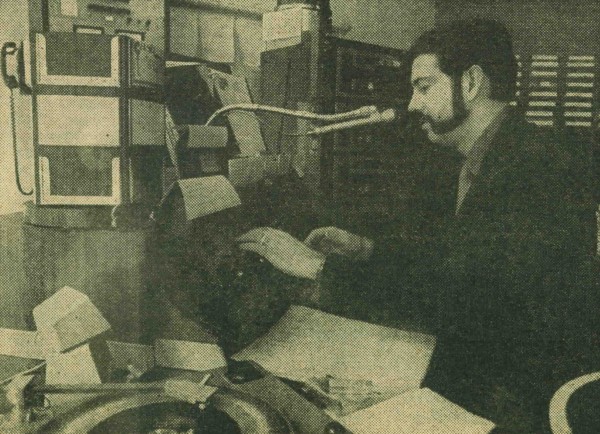
Carl Truman Wiglesworth: A little
relevancy music, please. Also at WKLO.
"The question is," said
Wiglesworth, "are we here to play games, shout 'Number 16!' and shuck
the folks or are we here to say something and give them something of
value? Like the record 'Doesn't Somebody Want To Be Wanted?' by the
Partridge Family. People over 65, people who are lonely, they understand
what they're saying in that song. But people 35 to 50 think there must
be something more to it - something hidden in the lyrics.
"The value of a jock is to understand the music enough and care enough
to say something about it besides 'Boy, this is really groovy!'"
The trend, at any rate, has been away from the programmed "zanies" to
"responsible" individualism. Responsible because no one is going to say
much of anything that would offend a large group of people, excepting
the heralded Skinny Bobby Harper who left WAKY not long after he baited
University of Kentucky football fans. He probably did his health a great
service.
It is individualistic in that the jocks (or "announcers,"
"personalities," whatever you will) are allowed, if not encouraged, to
develop personal styles, to be human, to be the guy who's communicating
with you, not talking at you. As Bailey says, "I actually communicate
with the average man. I'm not so much interested in entertaining them as
talking to them."
The money is indisputably good - the average salary for a jock in
Louisville is probably somewhere in the mid-teens. But is that
satisfaction enough? Why do men get into the business?
Weird Beard, whose real
name is Carl Markert, is a small, pale man, just turned 26, who decided
early what he wanted. "I was sick in bed for two years as a kid and I
listened to radio all the time. I decided then it was a good way to make
a living.
"I think all jocks would like to think that throngs of people flock to
the radio to turn on their show, but I don't think it exists anymore. If
I'm sick, there's only a handful of people who'd turn it off because the
Beard wasn't there, 'cause whoever replaces me plays the same stuff.
It's the music the people want."
He paused for a moment. He has a late night show, and the street was
empty. Then a car went by, slowly, and a girl waved to him. "I like to
play records, being the Weird Beard, being a part of so many people. I
like meeting the artists who come into town. I like who I've made myself
become."
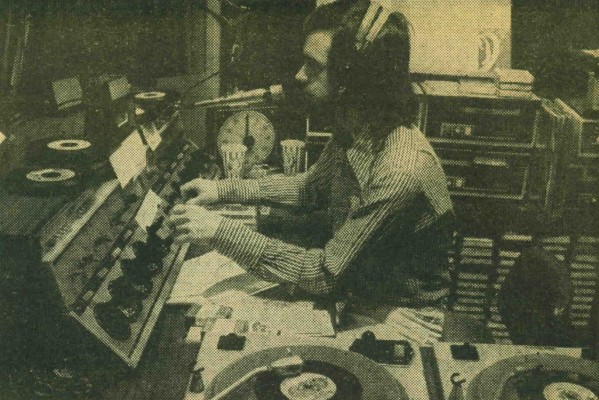
Weird Beard at WAKY: Put a star on the
door.
IT STARTED here with
Gordon McLendon, a noisy, boisterous industry not unlike a squally baby.
Now, it's in the hands of men like Wiglesworth and Randolph, more
sedate, by comparison, but still quick-paced and loud. The lesson
learned after 13 years, and advanced by a man, Barr, whose station has
learned only too well from rock radio, is this: "If you're doing the
same thing a year from now that you're doing today, you're in trouble."